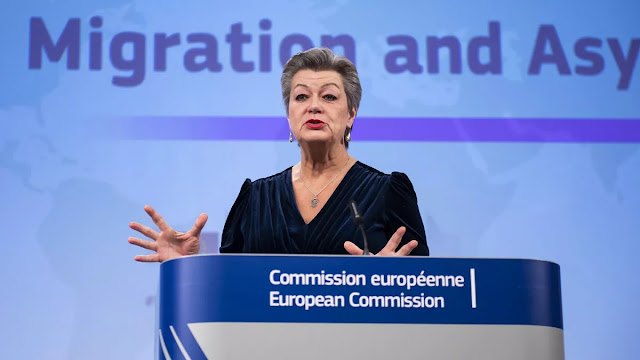EU countries not enforcing migration pact could face legal action, says Johansson
EU migrant crisis
In recent years, the European Union has been faced with a significant influx of migrants seeking refuge and better opportunities within its borders. This has given rise to what is commonly known as the "EU migrant crisis," a complex and multi-faceted issue that requires careful consideration and decisive action from EU member states.
The EU migrant crisis has put immense pressure on countries to develop and implement effective immigration policies and border control measures. The challenges posed by this crisis have also sparked debates and discussions about the need for a comprehensive and unified approach to managing migration within the EU.
EU immigration policy
The EU has been working to address the migrant crisis through its immigration policy, aimed at ensuring a fair and humane treatment of migrants while also protecting the security and interests of member states. The EU immigration policy provides guidelines and regulations for the admission, residence, and integration of migrants into European societies.
However, the enforcement of EU immigration policy has been a contentious issue, with some member states failing to fulfill their obligations and failing to adequately manage and control the flow of migrants into their territories. This has resulted in an uneven distribution of migrants across the EU and has strained the resources and capacities of certain countries.
EU migration policy
The EU migration policy is a broader framework that encompasses various aspects of migration, including the asylum system, border control, and the integration of migrants into European societies. It aims to provide a coordinated and comprehensive approach to managing migration within the EU, taking into account the social, economic, and security considerations of member states.
However, the effectiveness of EU migration policy depends heavily on the commitment and cooperation of member states in implementing its provisions. Failure to enforce the EU migration policy not only undermines the integrity of the EU's external borders but also hampers the EU's ability to effectively address the challenges posed by the migrant crisis.
EU border control
Border control is a critical component of the EU's efforts to manage migration and ensure the security of member states. It involves the monitoring and management of the EU's external borders to prevent unauthorized entry and to facilitate the orderly and legal movement of people across borders.
While the EU has established common rules and standards for border control, the responsibility for enforcing these rules lies with individual member states. The failure of some countries to effectively control their borders has resulted in a lack of coordination and cooperation, allowing migrants to enter the EU through irregular and unsafe routes.
To address these challenges, the EU is taking steps to strengthen its border control mechanisms and enhance cooperation among member states. This includes the establishment of the European Border and Coast Guard Agency, which aims to provide technical and operational assistance to member states in managing their borders and ensuring a harmonized approach to border control.
It is crucial for all EU member states to fulfill their responsibilities and obligations under the EU immigration and migration policies, including the enforcement of border control measures. Failure to do so not only undermines the effectiveness of the EU's response to the migrant crisis but also puts the burden on other member states, leading to an unequal distribution of migrants and a strain on resources.
Elevating the enforcement of EU migration pact
Recently, the European Commissioner for Home Affairs, Ylva Johansson, has highlighted the importance of enforcing the EU migration pact and has warned that countries failing to comply could face legal action. The migration pact, proposed by the European Commission in September 2020, aims to create a more predictable and sustainable system for managing migration within the EU.
Johansson stressed that the enforcement of the migration pact is essential to ensure a fair and equitable distribution of responsibilities and to address the challenges posed by the migrant crisis effectively. This includes the implementation of measures to strengthen border control, improve asylum systems, and enhance cooperation among member states in managing migration flows.
By taking legal action against countries that do not enforce the migration pact, the EU aims to send a strong message that non-compliance with EU policies and obligations will not be tolerated. This not only serves as a deterrent for member states but also reinforces the commitment of the EU to address the migrant crisis in a transparent, lawful, and consistent manner.
In conclusion, the EU migrant crisis poses significant challenges to member states and requires a comprehensive and unified approach to manage migration effectively. The enforcement of EU immigration and migration policies, particularly in relation to border control, is crucial to maintaining the integrity of the EU's external borders and ensuring the security and well-being of member states. The recent emphasis on enforcing the EU migration pact and the potential for legal action against non-compliant countries signifies the EU's commitment to addressing the migrant crisis and finding sustainable solutions for the benefit of all.

